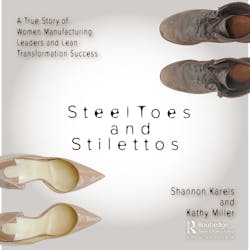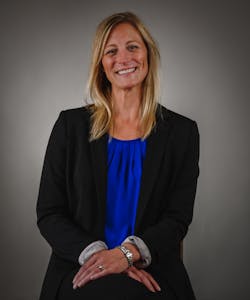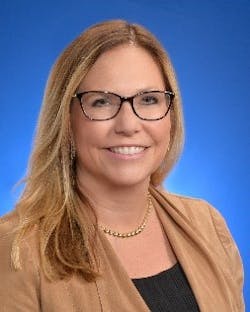The Changing Role of Women in Manufacturing
To understand someone’s journey, you have to walk a mile in their shoes.
For two women manufacturing executives, deciding the right shoes to wear is the framework upon which they tell the story of how they accomplished lean transformations at the plants they managed.
In their new book, Steel Toes and Stilettos, Shannon Karels and Kathy Miller use shoes as a way to help readers visualize the choices they made in their careers.
“It’s a decision that every female professional faces eventually,” says Miller in the book. “It is a significant choice, one that will contribute to your personal brand, one that you will be judged by either consciously or subconsciously.” She chose the heels as her brand.
However, in a conversation I had with them about the state of women in the industry, I would venture to say that both feel things have changed since the early days of their careers.
First a word on their backgrounds: Karels is a senior operations manager who has led multiple lean transformations and run operations for two large publicly traded companies across various industries.
Miller has held roles as global vice president, senior operations executive, and director in manufacturing and lean enterprise leadership. She is a Shingo Prize recipient for large businesses as a plant manager.
The book offers first-hand accounts of how these women achieved success in lean transformations at a variety of manufacturing companies.
Q: What has changed for women since you started your career?
Karels: I went to work in manufacturing directly out of college. In college, there wasn’t a gender discrepancy. In fact, women were favored due to what people considered our organizational skills. So when I started my job at a manufacturing company and got comments about being a woman and they were joking about my safety shoes, I was shocked. I wasn’t prepared for that reaction. I decided I would just brush it off and moved on because I had to. I didn’t feel like I had to work harder, as many women felt, as I’m inherently a hard worker, I just wanted to do a good job.
I feel that as women we deserve a seat at the table, not because we are women, but because we work hard.
Miller: Early in my career I had to overcome inappropriate comments and behavior. In the book, I recall my first trip to a manufacturing company, where I was accompanied by my dad. As we walked the floor the things that were said to me were very upsetting. But my dad told me that they didn’t mean anything by it and that I should just do my best and I would be fine. And it was.
At the end of the day, your results are what get you promoted into corporate positions. But when someone would say: “Oh, a female vice president of operations, I have never met one of those before,” it did bother me. Why was I minimized for one aspect of my identity?
Things have changed and now I feel men and women are allies, and so now it's not necessary to overcome the things that I had to back in the day.
Q: How do you view inclusivity?
Miller: To me, it's having respect for all human beings and their contributions. Whenever I would go into a plant, either in a leadership role or as a member of a team, I have respect for the people and the jobs they do. Everyone has something to offer, not just their hands but their hearts and minds.
In my leadership role, I find the commonality we all have and encourage everyone to contribute. When implementing lean, I always start with where we were trying to go. I explain the vision, especially for those who didn’t have experience with lean. Everyone was involved with the journey and of course, we got better results. The people who are with the products, the materials and the processes day in and day out understand the nuances. I would incorporate as many ideas as were offered and would provide an explanation if I wasn't able to use an idea. It was interesting how implementing lean gained momentum as more people got involved and saw how valued their input was.
As a leader you get snapshots in time, so making sure you ask the opinion of those who do the work daily is key. And when people take ownership of the journey, it's successful.
Q: What advice would you give to leaders?
Karels: I think it’s so important to be your authentic self. And that isn't always easy. At times that would get lost in the mix for me personally and I had to bring myself back to that. We need to recognize that all of us have unique gifts and values to bring to our organizations regardless of gender, race or color. Be confident about those skills and share that with the world. Results of your work will win the day.
Miller: I have always heard that women are better at soft skills and that was basically our ROI. Aren’t we past that? I think the answer to that is that it varies by the culture of the organization. I recently finished my master's degree in Applied Positive Psychology and there were as many men in the class as women. Everyone now understands the value of these skills. I think a recent example is that of the number of people resigning saying that they don't want to work in a toxic organization. They want one that has a healthy culture. People who run great organizations have to have these skills, no matter their gender.
Q: What should the manufacturing sector be doing to attract more women?
Karels: A lot more promotion needs to be done educating women that the field offers a great and purposeful career. One of the first steps is to review how we view education. I think as a society we have come to appreciate the value of having an education in the trades, in whatever form. I’m so happy to see that type of education come back.
And for this younger generation, technology is what they have grown up with which means that manufacturers have to make sure they are investing in technology and letting potential employees know the role technology will play in their jobs. This is how we are going to attract the younger generation.
Another aspect that is important to younger people is a roadmap. They want a clear view of their career. However, within that structure, there is still room for improvising. I looked for opportunities and when they presented themselves I went with my gut and pursued them.
Miller: Meaningful work is important to all humans at a basic level, and the more manufacturing can help women, and everyone, find this in their work the more successful the company will be.



